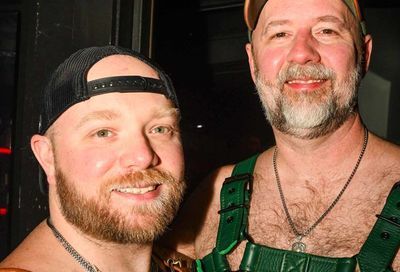Georgia trans woman sets herself on fire to protest lack of support during COVID-19
Stay-at-home orders have prevented trans sex workers from earning money during the pandemic

A transgender woman set herself on fire in the Georgian capital of Tbilisi in protest over a lack of support for trans sex workers during the COVID-19 pandemic.
Madona Kiparoidze was with other trans sex workers outside Tbilisi’s city hall on April 30 protesting stay-at-home measures — including a nighttime curfew — that have prevented the women from earning money, Reuters reports.
In footage captured by local media, Kiparoidze was seen running down a street with her jacket on fire, as police chased her. She was stripped of her jacket and subsequently arrested.
After being detained, she shouted: “I am a transgender woman and I’m setting myself ablaze because the Georgian state doesn’t care about me.”
Kiparoidze was taken to hospital and treated for her injuries, which were reportedly not life-threatening. The country’s interior ministry issued a statement saying that an investigation into the incident was underway.
Another trans sex worker who was protesting alongside Kiparoidze told local media that the women “can’t even pay for our rent. What can we do?”
Tamaz Sozashvili, co-founder of Tbilisi Pride, characterized Kiparoidze’s protest as an “attempted suicide.”
“Today, [a] trans woman tried to commit a suicide in front of Tbilisi City Hall to protest [the Georgian government’s] immobility and ignorance towards them during COVID-19 crisis,” Sozashvili wrote. “Trans people are among most vulnerable groups in Georgia.”
Today, trans woman tried to commit a sucide in front of #Tbilisi City Hall to protest @GovernmentGeo's immobility and ignorance towards them during #Covid19 crisis.
Trans people are among most vulnerable groups in #Georgia@kakhakala @HumanRightsGeo#HumanRights #LGBT #Equality pic.twitter.com/X9YEKkaTN6
— Tamaz Sozashvili (@TamazSozashvili) April 30, 2020
In March, women’s rights organization Women’s Initiatives Supporting Group (WISG) urged the Georgian government to better protect transgender women who are disproportionately affected by stay-at-home orders designed to limit the spread of COVID-19 in the country.
“Consider women engaged in sex work, especially transgender women, as a group of special needs and help them according to their needs, for most of them lack moral and financial support from their own families,” the group said in a statement, as reported by LGBTQ Nation.
“Furthermore, many of them live on rent, which they are unable to cover and they cannot afford to meet their basic needs in social distancing conditions due to the specificity of their work.”
While Georgia has made some moves towards equality, including banning discrimination based on sexual orientation and gender identity in 2014, the conservative nation outlaws same-sex marriage, open military service, and joint adoption by same-sex couples.
Though transgender people are able to legally change their gender, it requires them to undergo gender reassignment surgery — something not covered under Georgia’s health care system, putting the expense out of reach for many trans Georgians.
Last year, two transgender men petitioned the European Court of Human Rights to challenge Georgia’s requirements for legal gender recognition, with the European Human Rights Advocacy Centre reporting that, without official documents reflecting their gender identity, the men “have been subjected to humiliating treatment and verbal abuse when they have shown their identity documents.”
“The process of legal gender recognition is not regulated by the State,” Keti Bakhtadze, a lawyer for the Women’s Initiative Supporting Group, said in a statement at the time. “This increases the risk of unemployment and poverty for transgender people, leading to their marginalization, and rendering them vulnerable to transphobic hate crime. Stigma, unemployment and poverty present further obstacles for trans people in accessing the tools they need to seek legal gender recognition, creating a vicious circle, which is extremely difficult to overcome.”
Read more:
Ted Cruz criticizes Hollywood for censoring gay scenes in Freddie Mercury biopic Bohemian Rhapsody
Indiana restaurant hires drag queens to deliver curbside pickup
Survey: Nonbelievers, especially LGBTQ nonbelievers, face significant discrimination and stigma
Support Metro Weekly’s Journalism
These are challenging times for news organizations. And yet it’s crucial we stay active and provide vital resources and information to both our local readers and the world. So won’t you please take a moment and consider supporting Metro Weekly with a membership? For as little as $5 a month, you can help ensure Metro Weekly magazine and MetroWeekly.com remain free, viable resources as we provide the best, most diverse, culturally-resonant LGBTQ coverage in both the D.C. region and around the world. Memberships come with exclusive perks and discounts, your own personal digital delivery of each week’s magazine (and an archive), access to our Member's Lounge when it launches this fall, and exclusive members-only items like Metro Weekly Membership Mugs and Tote Bags! Check out all our membership levels here and please join us today!



























You must be logged in to post a comment.